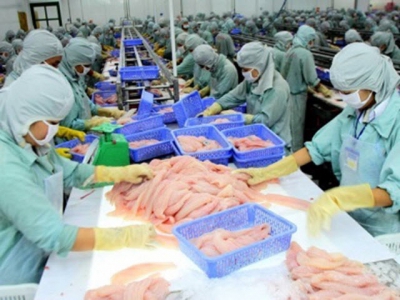Vietnamese pangasius exporters urged not to panic as China conducts additional inspections

The Vietnam Association of Seafood Exporters and Producers (VASEP) has asked pangasius companies to stay calm as their export cargoes began piling up at Chinese ports due to the latter’s increased inspections on imported frozen seafood.
In a statement released on 30 November, VASEP said since 10 November, at major Chinese ports, customs authorities are now testing all frozen seafood cargoes for the coronavirus. As a result, cargoes of Vietnamese seafood, including pangasius, are facing delays in delivery.
On 23 November, VASEP sent its members a letter, asking them not to panic.
“VASEP recommends that pangasius processors and exporters stay calm and avoid lowering their export prices, because this will not make the clearance process at ports faster,” the trade group said, though it acknowledged concerns about additional costs if the situation continues long-term.
VASEP recommended Vietnamese exporters work closely with their Chinese trading partners to reschedule shipping plans so cargoes don't get stuck at Chinese ports. It said said it hopes the situation will soon be resolved with rising year-end demand in China.
Additionally, VASEP sent a letter to the ministries of agriculture, trade, and foreign affairs, asking them to work with their Chinese counterparts to quickly address the issue. It asked the ministries to remind China that Vietnam has successfully contained the spread of the coronavirus, with almost three months of no community transmission. It also noted Chinese importers had recommended that Vietnamese pangasius companies temporarily suspend exports to China to avoid losses for both sides.
China remained the largest buyer of pangasius from Vietnam, with sales value reaching USD 428.3 million (EUR 359.4 million) between January and October, down 18 percent year-on-year. But from October, Chinese importers began increasing their buying to meet rising domestic demand.
Related news
 U.S. to re-evaluate food safety for Vietnamese tra fish next month
U.S. to re-evaluate food safety for Vietnamese tra fish next month The Food Safety and Inspection Service (FSIS) under the U.S. Department of Agriculture is expected to send a working team to Vietnam to evaluate
 Cần Giờ has enormous potential for high-value aquatic products, swift nests
Cần Giờ has enormous potential for high-value aquatic products, swift nests After switching to breeding spotted Babylon snails nine years ago Hùynh Văn Mảnh’s income has risen by multiple times compared to breeding shrimp or fish.
 January seafood export is estimated to reach $644m
January seafood export is estimated to reach $644m Vietnam takes in USD 3 billion from exports of forestry, agricultural and seafood products, equally to 84.3% of the same period last year.
 Seafood export value down in January
Seafood export value down in January Việt Nam’s total seafood export value in January fell by 12.5 per cent to US$644 million year-on-year due to the impacts of the novel coronavirus epidemic
 Ninh Thuận develops sustainable marine aquaculture
Ninh Thuận develops sustainable marine aquaculture To improve the efficiency of sea-based aquaculture using floating cages, the province has instructed localities to adopt Norwegian techniques and organic